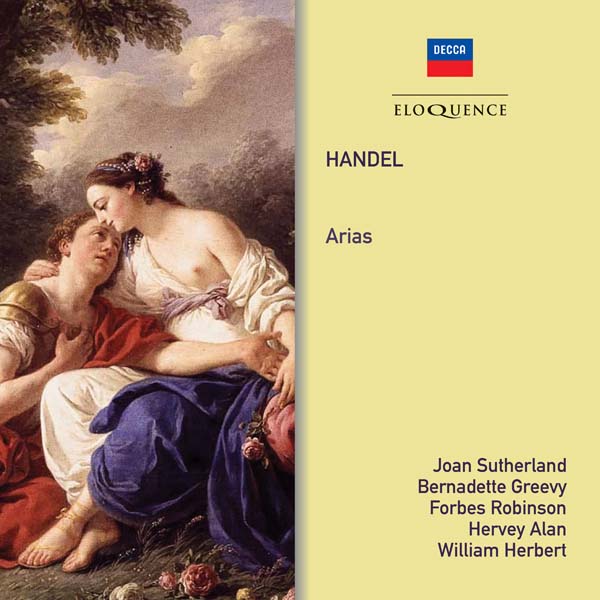A newly compiled anthology of Decca recordings on Eloquence, surveys the healthy state of Handel singing in England in the 1960s, before this music became the preserve of musicians and singers within the period-instrument movement.
This generous (145-minute) collection is based around a pair of newly re-mastered recital albums made by the contralto, Bernadette Greevy and the bass, Forbes Robinson. Greevy was a true contralto in the tradition of Kathleen Ferrier, Helen Watts, Janet Baker and Norma Procter. Her 1965–56 recital was drawn from a wide range of Handel’s Italian operas (‘Ottone’, ‘Partenope’, ‘Alcina’, ‘Admeto’, ‘Rodelinda’, ‘Rinaldo’, ‘Atalanta’) and it displayed the richness of her voice to fullest advantage as well as formidable vocal technique and excellent Italian diction. Robinson’s 1966 recital, represents a wide spectrum of the composer’s music in opera, ode, masque and oratorio from 1719 through the 1740s, including familiar favourites (‘O ruddier than the cherry’ in ‘Acis and Galatea’) alongside much rarer delights such as ‘Si, tra i ceppi’ from the early ‘Berenice’.
Decca led the way in the Handel revival of the 1950s. A trail-blazing ‘Messiah’, conducted by Sir Adrian Boult, presented the oratorio in an authentic version with up-to-date scholarship. It was followed by ‘Sosarme’ and ‘Semele’ on the label’s early-music imprint, L’Oiseau-Lyre. The very first L’Oiseau-Lyre stereo LP was ‘Music of Handel’, issued in January 1959 and excerpted here. It featured two well-established British singers, the tenor, William Herbert and the bass, Hervey Alan. There was also the newcomer from Australia, Joan Sutherland: the two Handel arias from ‘Alcina’ she recorded for L’Oiseau-Lyre was her very first recording for the Decca group. Some of her freshest singing dates from her early years with the 1958 and 1959 Handel performances representing her vocal art at its purest.
The compilation is completed with Sutherland in full flight, excerpted from the 1964 ‘Giulio Cesare’ and the two albums that made her name, ‘The Art of the Prima Donna’ (1960) and ‘The Art of Bel Canto’ (1964).
GEORGE FRIDERIC HANDEL
CD 1
Ottone: Vieni, o figlio
Partenope: Voglio dire
Alexander Balus: Convey me to some peaceful shore
Alcina: Verdi prati
Ottone: La speranza
Admeto: Cangio d’aspetto
Rodelinda: Dove sei
Rinaldo: Lascia ch’io pianga
Atalanta: Care selve
Clori, Tirsi e Fileno: Come la rondinella
Bernadette Greevy, contralto
Alcina: Tornami a vagheggiar
Alcina: Ombre pallide
Giulio Cesare: V’adoro, pupille
Giulio Cesare: Da tempeste il legno infranto
Samson: With plaintive note
Samson: Let the bright seraphim
Joan Sutherland, soprano
CD 2
Esther: Tune your harps to cheerful strains*
William Herbert, tenor
Esther: Turn not, O Queen, thy face away*
Hervey Alan, bass
Alexander’s Feast: Revenge, Timotheus cries
Ezio: Se un bell’ardire
Susanna: Peace crown’d with roses
Hercules: The God of Battle
Acis and Galatea: O ruddier than the cherry*
Theodora: Wide spread his name
Judas Maccabaeus: Arm, arm ye brave*
Berenice: Si, tra i ceppi*
Semele: Leave me, loathsome light
Alcina: Pensa a chi geme
Samson: Honour and arms
Forbes Robinson, bass
*FIRST INTERNATIONAL RELEASE ON DECCA CD
Recording Producers: Michael Bremner (Greevy, Robinson); Ray Minshull (Sutherland: Alcina, Alan, Herbert), Ray Minshull, James Walker (Sutherland: Let the bright seraphim); Christopher Raeburn & Ray Minshull (Sutherland: Giulio Cesare); Christopher Raeburn (Sutherland: With plaintive note)
Balance Engineers: Kenneth Wilkinson, Stanley Goodall (Greevy); Kenneth Wilkinson, Alan Reeve (Robinson); unknown (Sutherland: Alcina, Alan, Herbert); Peter Attwood, Kenneth Wilkinson (Sutherland: Let the bright seraphim); James Brown (Sutherland: Giulio Cesare); Arthur Lilley, Arthur Bannister (Sutherland: With plaintive note)
Recording Locations: Kingsway Hall, London, UK, 26–29 October 1965 & 14 February 1966 (Greevy), 6–9 September 1966 (Robinson), 15–18 August 1960 (Sutherland: Let the bright seraphim); Decca Studio 1, West Hampstead, London, UK, March 1958 (Sutherland: Alcina, Alan, Herbert); Decca Studio 3, West Hampstead, London, UK, 3–6 July 1963 (Sutherland: Giulio Cesare), June 1963 (Sutherland: With plaintive note)
Remastering Engineer: Paschal Byrne
‘Sutherland sings with a beautiful tone, a sure technique and a true feeling for the style of the music. She makes it all sound so easy too. The accompaniments are well played and the recording is first rate.’ (Music of Handel) Opera magazine, March 1959
‘[This] is mainly Sutherland’s record, and her florid elaborations of melodies turn da capos into things of delight and wonder … Richard Bonynge, too, conducts with splendid sense of style’ (Giulio Cesare) The Stereo Record Guide
‘This Irish contralto is a real discovery … She sings with style and feeling, and the recital is one that can be listened to repeatedly with growing pleasure … The accompaniments are admirably realized, and Raymond Leppard’s contributions on the harpsichord are worthy of a disc all to themselves.’ (Greevy) Opera magazine, December 1966
‘A mouthwatering recital of bass lollipops from Handel’s operas and oratorios… This is easily the most enjoyable record of the kind that has come my way.’ (Robinson) Peter le Huray in Audio Record Review, May 1967

